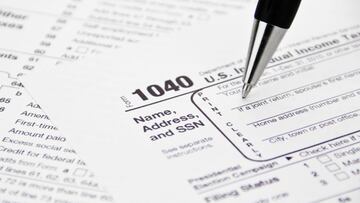Tax Filing 2021: State deadlines and what you need to know to prepare
The IRS has pushed back the federal tax filing deadline to 17 May. Has your state? Here’s an overview for the 2021 state income tax landscape.

Tax season looks a little different this year, and with deadlines varying across states, it is more important than ever to see what you are expected to prepare and by when.
With new legislation impacting the US federal tax code passed in March, the federal government decided to move back Tax Day to 17 May. This action has forced states to consider postponing their own deadlines. While some states have chosen to follow the lead of the federal government, others do not think that a delay will serve their citizens or their budgets.
- IRS announces weekly stimulus check payments
- Will the 2021 tax deadline be extended again?
- Why would you have to return my third stimulus check?
- When will the IRS send unemployment tax refunds in May?
- When must states decide to offer tax break on unemployment benefits?
An overview for the 2021 state income tax landscape
So far, two states have decided to stick with their initial April deadlines, thirty-six states have made the decision to postpone to 17 May, and four have chosen to delay until June or July. States where residents are not required to pay state income tax have reminded their residents that they still need to file their federal income taxes by 17 May.
Below is provided a general overview of which states have decided to push back their filing deadline for individuals. For the specifics, it is best to follow the link to your state’s tax department to see what the requirements for this year look like.
#IRS tip: #IRSFreeFile can help people who have no filing requirement find overlooked tax credits and get a refund if eligible. Read the details: https://t.co/SQvnJFAqmR pic.twitter.com/36SfyeYLiW
— IRSnews (@IRSnews) April 15, 2021
State Income Tax Filing Dates 2021
State Income Tax Not Required
Alaska, Florida, Nevada, South Dakota, Texas, Washington, and Wyoming
Deadline Not Extended
Hawaii, New Hampshire
Deadline Extended to May 17
Arkansas, California*, Connecticut*, Colorado*, District of Columbia*, Delaware*, Georgia*, Illinois*, Idaho, Indiana*, Kansas*, Kentucky*, Massachusetts*, Maine*, Michigan*, Minnesota*, Mississippi, Missouri*, Montana*, Nebraska*, North Carolina*, North Dakota, New Jersey*, New Mexico, New York*, Ohio*, Oregon, Pennsylvania*, Rhode Island*, South Carolina*, Tennessee*, Utah*, Vermont, Virginia**, West Virginia*, Wisconsin*
*The extension does not apply to estimated tax payments due 15 April, 2021.
**The first quarter estimated tax payment is still due 3 May, 2021
Deadline Extended Beyond 17 May
Iowa (1 June, 2021), Louisiana (15 June, 2021), Maryland (15 July, 2021), Oklahoma (15 June, 2021)
For more information, check out this fantastic article put together by the Association of International Certified Professional Accountants (AICPA). The article provides additional information for companies and other entities on how and when they should be prepared to pay taxes to each state this year.
We are experiencing our busiest phone days of the year; Use “Where’s My Refund?” to track the status of your tax refund. https://t.co/PFiedQsvmp pic.twitter.com/7PfcwqjY8l
— IRSnews (@IRSnews) April 14, 2021
States where residents are not required to file state income tax
Those in states where no income taxes need to be filed, including Alaska, Florida, Nevada, South Dakota, Texas, Washington, and Wyoming residents, should remember that their federal declarations must be made on or before 17 May, 2021.
States where no extensions have been provided
Taxpayers in both Hawaii and New Hampshire should be aware that no deadlines have been extended.
Hawaii’s Department of Taxation released a statement in March saying that no extension would be given at the state level and that residents would be required to file their taxes by 20 April, 2021. However, residents who do not file their taxes by the 20 April deadline will automatically be given an extension until 20 October, 2021, if “The taxpayer is due a refund” or “The taxpayer pays the properly estimated tax amount owed by 20 April, 2021. Taxpayers who are not able to pay the properly estimated tax amount owed should pay as much as they can to avoid additional interest and penalties.”
Related stories
Additionally, in March, New Hampshire’s Department of Revenue Services stated that they felt “any extension to the 15 April, 2021 due date, even by one month, risks causing confusion and does not offer meaningful relief to taxpayers who will still need to complete their 2020 tax return to calculate the estimated tax payment that continues to be due on 15 April, 2021.”
You must file a return where you are a resident and where you reside, in addition to your federal tax return
Americans move around to go where the work is, but that doesn't mean that they stop residing in their home state. So, for example, if you work in Nevada but you are a resident of California, you still need to report the income you earned in Nevada to the tax agency in California as well as your federal tax filing. Likewise, if you are a Florida resident but work in Georgia, you will need to file a non-resident Georgia return even though Florida is a tax-free state.

